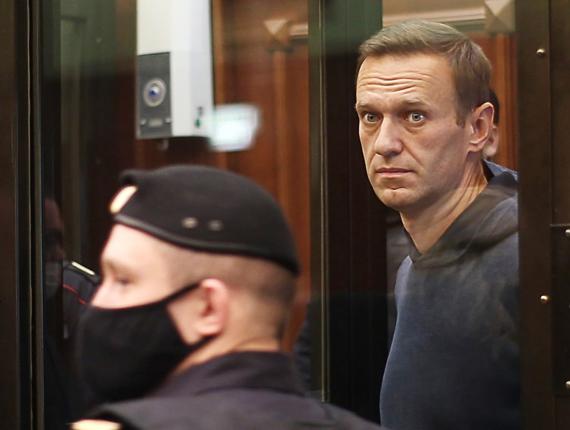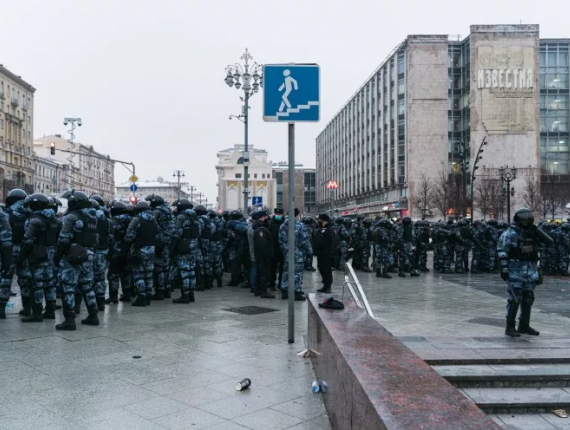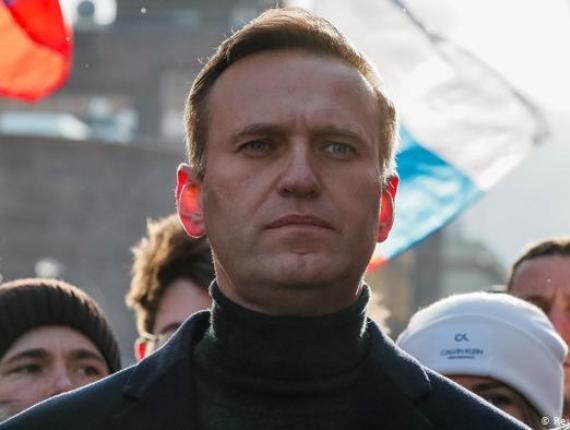Stop the Crackdown! Release Navalny and All Political Prisoners!
Statement by Memorial Human Rights Centre
The court’s decision on 2 February 2021 to imprison Aleksei Navalny is politically motivated and arbitrary. It has nothing to do with law.
There is no legal basis for the decision to replace Navalny’s suspended sentence with a real term in prison. He did not hide from anyone and he had left the country involuntarily and temporarily. The decision contradicts the spirit and letter of the law. The judgment also directly and obviously violates the Russian Federation's obligations under the European Convention for the Protection of Human Rights and Fundamental Freedoms. Navalny's 2014 conviction was found by the European Court of Human Rights to violate Article 6 (right to a fair trial) and Article 7 (no punishment without law) of the Convention. Both legal entities that were declared victims in the case stated in court they had sustained no harm.
Aleksei Navalny was detained and then remanded in custody in violation of the law as soon as he voluntarily returned to Russia following an attempt on his life (of which the Russian authorities have been accused, arguably with justification) despite threats and ongoing prosecutions in connection with two other criminal cases. The decision to impose a real term of imprisonment in these circumstances underscores the politically motivated and immoral nature of the authorities' actions.
*****
These repressive measures against Aleksei Navalny are only the most egregious episode in the most powerful campaign of intimidation against Russian civil society of recent decades, a campaign which began in late 2020 with the introduction of amendments to legislation that restricted virtually all constitutional rights and freedoms of citizens.
We strongly condemn both this campaign and the unprecedented crackdown by the Russian authorities on freedom of assembly and freedom of expression that followed Navalny's detention. More than 11,000 people were detained during the large scale protests that took place on 23 and 31 January and 2 February.
The authorities cite a lack of official approval for the demonstrations. However, this cannot be a justification for police violence, particularly where advance notification of a demonstration is not possible and, in the case of public reactions to events that have just taken place, where protests have a spontaneous character. It should be noted that the procedure for obtaining authorisation for public events in recent years has, as a rule, been effectively reduced by the authorities to a prohibition on the exercise of the right to freedom of assembly.
The Russian authorities have used the Covid-19 epidemic as a pretext to ban public protests altogether. The unreasonableness of this approach is particularly evident given that other forms of mass gathering, including those indoors, have been permitted.
In an attempt to thwart protests against the pre-trial jailing and subsequent conviction of Aleksei Navalny, the authorities disrupted the normal course of life in dozens of Russian cities by blocking main roads, disrupting public transport and restricting freedom of movement. In effect, they imposed an undeclared state of emergency. The events on the streets resembled police raids from war movies; the rights of those detained were violated en masse and many of them were in fact tortured. Dozens of people were beaten, including journalists carrying out their professional duties. There are reports from Russia’s regions of peaceful protesters being fired from their jobs and expelled from educational institutions.
Criminal charges have been brought in more than two dozen cases, most of which have no basis in law. Even where these cases concerned actual violence against public officials, what in fact took place was resistance to violence by the security forces or a reaction to their unlawful and aggressive actions. Unless the actions of the security forces are themselves investigated and evaluated, it is impossible to evaluate the response of protesters. However, at present there are no known instances of bringing law enforcement officers, who violated en masse both citizens' rights and the demands of the law during those days, to justice.
The criminal prosecutions brought for blocking communications and transport infrastructure and obstructing the movement of traffic and pedestrians (Article 267 of the Criminal Code) or violating sanitary and epidemiological rules (Article 236 of the Criminal Code) appear ridiculous and cynical. It was the authorities and law enforcement officers who basically blocked communications and impeded movement by blocking streets, neighbourhoods and the entire city centre, closing underground stations and changing public transport routes. It is the authorities and law enforcement officers who placed thousands of people in cramped and unsanitary conditions in police vans, police cells and special detention centres for many days with no justification. It is the authorities who are responsible for the impact these actions will have on the ongoing pandemic.
*****
The Russian authorities have unashamedly unleashed a massive political crackdown. We demand, and urge everyone - in Russia and abroad - to demand that the Russian authorities stop arbitrary restrictions and mass violations of human rights, ensure freedom of assembly, release all those wrongfully and unjustifiably detained and jailed for taking part in peaceful protests, and, of course, immediately release Aleksei Navalny and other political prisoners!




